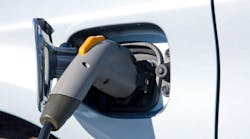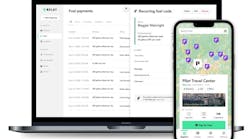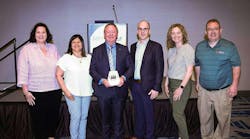The study compared emissions from current in-use diesel and compressed natural gas (CNG) fueled buses to emissions from a similar diesel fueled bus equipped with advanced pollution controls. CARB chairman Alan Lloyd said the test results suggest that both CNG and diesel engines need additional emission controls.
Although total particulate matter and nitrogen oxide emissions from CNG-powered vehicles are lower than diesel engines, Lloyd said the data suggest that the levels of some toxic pollutants in CNG exhaust require further study and may warrant additional control.
He noted that the CNG bus used in the test did not have a particulate filter or other proven aftertreatment equipment, such as an oxidation catalyst.
Additional tests are now being conducted that will use the same CNG bus refitted with an original equipment manufacturer's oxidation catalyst along with a new production-line CNG bus equipped with a manufacturer-installed oxidation catalyst to see if aftertreatment systems lower those emission levels. The results of these tests should be available later this year, he said.
CARB added that a diesel bus equipped with a new particulate filter produced promising test results for several pollutants. This bus, running on low sulfur fuel, produced lower emissions than either the diesel or CNG "baseline" buses in terms of the total mass of particulate matter (PM) and the amount of toxic organic compounds. However, both diesel buses had higher nitrogen oxide (NOx) emissions, and the filter-equipped diesel bus exhibited a substantial increase in the amount of NOx that is emitted as nitrogen dioxide (NO2). Heightened emissions of NO2 often leads to more rapid formation of atmospheric ozone and nitrate PM, CARB said.
CARB said the research study tested two buses on a dynamometer from March through June 2001, one runs on low sulfur diesel and the other on CNG. Both buses were standard, 40-passenger vehicles. Detroit Diesel Series 50 engines powered both. The diesel bus was run in two configurations: one a "baseline" with a Nelson catalyzed muffler, and the second with the muffler removed and replaced by a new Johnson Matthey Continuously Regenerating Technology particulate filter (Diesel/CRT.)
Some truck makers said CARB's test results show that "clean" diesel engines should be given a greater opportunity in the market.
"This new study reinforces the concept that regulatory decisions must be fuel neutral," said William Bunn, vp- health, safety and productivity at International Truck & Engine Corp.
"Public policies that in any way favor natural gas over diesel should be reconsidered pending peer review of the data in this new study, as well as other research now available," Bunn said. "CARB's research suggests the possibility of significant adverse health impact from widespread use of natural gas vehicles. Assertions that natural gas exhaust is not toxic are not credible. In fact, as this new study corroborates, low-emitting diesel exhaust may include fewer pollutants than natural gas exhaust."


